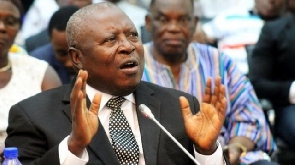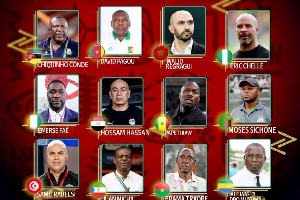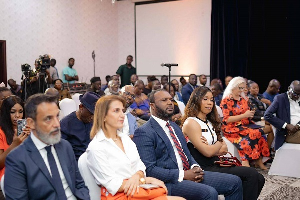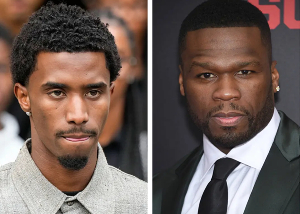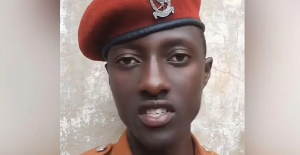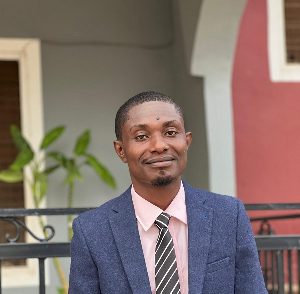Presidential election petition; is the constitution being ignored?
FOLKS:
As we are all aware, the Supreme Court has fixed April 16, 2013, for the hearing of the substantive Presidential Election Petition, challenging the election of President Mahama as declared by the Electoral Commission (EC), after the 2012 Presidential elections.
Interestingly, after 10 solid sittings, the Court considered and ruled on more than 21 Interlocutory Applications filed by the respective parties in the case.
The 9-member panel of Justices, after considering all issues raised, also set 2 issues for the trial, namely:
1. Whether or not there were statutory violations, omissions, irregularities and malpractices during the election held on December 7 & 8, 2012; and
2. Whether or not the said statutory violations, omissions, irregularities and malpractices affected the outcome of the elections.
These two issues were crucially centered on the petitioners’ ALLEGATIONS of persons being allowed to vote without biometric verification; some presiding officers and/or their assistants not signing declaration forms (pink sheets); total number of votes cast exceeding the total number of registered voters as well as total number of ballot papers issued; whether or not (IF ANY) the ALLEGED statutory violations brought about 4,670,504 invalid votes cast in the 2012 Presidential elections; as well as whether or not the said ballots cast without biometric verification (IF ANY) were taken into account by the Electoral Commission (EC) in the declaration of results, among others.
The Court also explicitly stated that the petitioners and the respondents in the case shall give oral evidence when the full trial begins and that all witnesses of the parties shall give their statements/evidence in the form of an affidavit, duly signed and sworn; and that it will only allow oral evidence from potential witnesses in the case based on compelling reasons.
Consequently, this Presidential elections petition, being a landmark one (the very first in the history of Ghana), the above issues have got some of us thinking what might happen during the trial, considering the 1992 Constitution, the Supreme Court (Amendment) Rules, C.I.74 of 2012, and other reported cases.
Article 1(2) of the Constitution states:
“The Constitution SHALL be the SUPREME LAW of Ghana; and ANY other LAW found to be inconsistent with any provision of this Constitution shall, to the extent of the inconsistency, be VOID.” (Emphasis is mine).
This literally means that, the Constitution is superior to all and any other law in Ghana; and any law in Ghana found discrepant with the terms of the Constitution is deemed lacking legal and/or binding force; hence, if the said law comes face-to-face with the Constitution, the Constitution SHALL supersede.
But Article 2 gives the grounds on which the said “inconsistent” law can be cured in course of time. This is one of the reasons why the General Secretary of the People's National Convention (PNC), Mr. Bernard Mornah, early this year brought an action in the Supreme Court for a declaration to that effect that some provisions in the Supreme Court (Amendment) Rules, C.I.74 of 2012, were inconsistent with the terms of the Constitution. But that suit still stands adjourned sine-die (indefinitely).
Considering the word “VOID” in Article 1(2) of the Constitution, “Law Guru” Lord Denning famously put it in MacFoy vrs. UAC Ltd. (1962) AC 152 at 160, PC; or (1961) 3 ALL ER 152; or (1961) 3 WLR 1405; which was cited with approval in Bakuma vrs. Ekor (1972) 1 GLR 133 at 152, CA, per Azu Crabbe JSC (as he then was), that:
“If an act is void, then it is in law a nullity. It is not only bad, but incurably bad. There is no need for an order of the Court to set it aside. It is automatically null and void without more ado; though it is sometimes convenient to have the Court declare it to be so. And every proceeding which is founded on it is also bad and incurably bad. You cannot put something on nothing and expect it to stay there. It will collapse.”
Clearly then, if any law is inconsistent, discrepant and/or not in agreement with any term of the Constitution, the Constitution becomes PARAMOUNT over that law.
Folks, to have a clear understanding of this submission; let us first consider how Prez John Dramani Mahama became the President of the Republic of Ghana before the 2012 General Elections. If you recall, former President John Evans Atta Mills died (may his soul rest in peace), on Tuesday, July 24, 2012, leaving the Presidency vacant. The former Vice President, John Dramani Mahama, was sworn into office hours later, in accordance with Article 60 (6)–(10) of the 1992 Constitution. My emphasis here lies on Article 60(6), which states:
“Whenever the President dies, resigns or is removed from office, the Vice-President shall assume office as President for the unexpired term of office of the President with effect FROM THE DATE OF THE DEATH, resignation or removal of the President.”
Therefore, in terms of Article 60(6), right from the time (seconds) of death of the sitting President, even before the swearing in of Prez John Dramani Mahama on July 24, 2012 in Parliament by the Chief Justice, he had already assumed the office as the President of the Republic of Ghana.
Folks, the Constitution gave the President some exemptions from Court actions while in office and/or some years after he has left office. Articles 57 (4), (5) & (6) of the Constitution also state:
“(4) Without prejudice to the provisions of article 2 of this Constitution, and subject to the operation of the prerogative writs, the PRESIDENT SHALL NOT, WHILE IN OFFICE, BE LIABLE to PROCEEDINGS IN ANY COURT for the performance of his functions, or for any act done or omitted to be done, or purported to be done, or purported to have been done or purporting to be done in the performance of his functions, under this Constitution or any other law”;
“(5) The PRESIDENT SHALL NOT, WHILE IN OFFICE AS PRESIDENT, BE PERSONALLY LIABLE TO ANY CIVIL OR CRIMINAL PROCEEDINGS IN COURT”; and
“(6) CIVIL or CRIMINAL PROCEEDINGS may be instituted against a person WITHIN THREE YEARS AFTER his CEASING TO BE PRESIDENT, in respect of anything done or omitted to be done by him IN HIS PERSONAL CAPACITY before or during his term of office notwithstanding any period of limitation except where the proceedings had been legally barred before he assumed the office of President.”
“Liable” in Article 57 (4) & (5) of the Constitution can be termed as “SUBJECT TO LEGAL ACTION” or “HELD LEGALLY RESPONSIBLE”.
Folks, in considering the above submission, the terms of Articles, 1(2) and 57 (4), (5) and (6), the President CANNOT BE LIABLE, thus, CANNOT BE “HELD LEGALLY RESPONSIBLE” or “SUBJECTED TO ANY LEGAL ACTION”, be it under his Presidential and/or Personal capacity.
The BIG Question then is, WHY should the PRESIDENT H.E. JOHN DRAMANI MAHAMA be part (as one of the Respondents) of the on-going Presidential elections petition?
I know some folks, will be quick to say, the President has been sued because of the provision of Form 30 set out in Part V of the Schedule of the Supreme Court (Amendment) Rules, C.I.74 of 2012, where, the Instrument defines “RESPONDENT” to “include THE PERSON WHOSE ELECTION IS CHALLENGED BY A PETITION and “THE ELECTORAL COMMISSION” where the Petitioner complains of the conduct of the Electoral Commission”; hence, the suing and/or inclusion of the President in the election petition, was brought about from the definition of the word “Respondent” in C.I.74 of 2012.
Significantly, the Constitutional Instrument known as the Supreme Court (Amendment) Rules, C.I.74 of 2012, was brought to birth IN EXERCISE of the powers conferred on the Rules of Court Committee by clause (4) of article 33, clause (3) of article 64 and clause (2) of article 157 of the Constitution.
Clearly, from the foregoing argument, some terms of the C.I.74 are very inconsistent with the terms of the Constitution; therefore, as per the import of Article 1(2) of the Constitution, the said inconsistent portion of the C.I.74 is VOID; and since void, per the case of Bakuma vrs. Ekor (1972) as quoted above, then, it is in law a nullity. It is not only bad, but it is also incurably bad.
As the Supreme Law of the land, the Constitution cannot be ignored for a void C.I.74 in this face-to-face encounter.
The drafters of the Constitution cannot be mocked. In their wisdom, they foresaw the problem and provided a remedy for it accordingly.
How then, is the Supreme Court—the Highest Court of the land—entertaining or soiling its hands with illegality, by entertaining the on-going elections petition before it, having noticed the presence of the sitting President in the suit as one of the Respondents—an act that the Constitution frowns on per Articles 57 (4), (5) & (6)?
Folks, just imagine that during the trial—considering the issues and the mode of trial adopted by the Supreme Court at the last hearing that, it shall take ORAL EVIDENCE from the petitioners and the respondents (the President, being the 1st respondent in the petition) and per his evidence the three petitioners will seek to cross-examine him accordingly—what at all is he going to say, especially when the Supreme Court, knowing very well that the President did not conduct elections and could not possibly have found himself everywhere in a particular material circumstance during the elections?
Technically, one would have argued that, the onus lies on the Legal Team of the President, who must per an application to the Court, seek an order from Justices for the President (be it in his Presidential or Personal capacity) to be unsuited from the case, basically on the grounds contained herein. Yes, I agree in part, but, I beg to differ otherwise. Why? Because the Supreme Court has the power to unsuit the President, especially as same is prima-facie evidenced on face of the record of the suit. If the law is said to be in the bosom of the Judges, then same must be applied accordingly.
Without prejudice, by the terms of this submission above, it is high time we acted in consonance with the CONSTITUTION (the Supreme Law of the land) in order not to undermine its terms in setting a bad precedent for the nation’s future leaders. ILLEGALITY IS SAID, CANNOT BE COMPROMISED.
God Bless.
ERIC E. ESSEL
Opinions of Monday, 15 April 2013
Columnist: Essel, Eric


